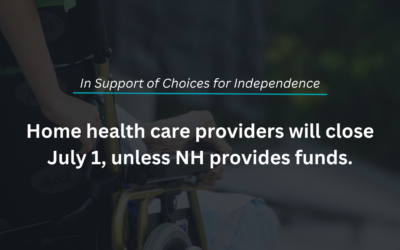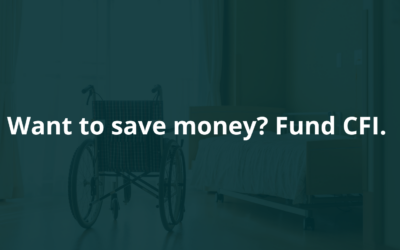Source: NH Business Review
Lack of funds threatens existence of hospice service program
The doomsday clock is ticking for in-home care service providers, and the midnight hour is July 1 – the day their doors could close if the NH Senate decides to undercut Medicaid funding from the House budget plan.
At the forefront is a lack of funds for the Choices for Independence (CFI) program, a Medicaid-funded initiative that provides in-home care services for aging adults and people living with disabilities or severe medical issues.
When individuals are fiscally and medically eligible to be in the CFI program, they can receive services such as a home health aide to help with eating, bathing, dressing, cooking and other personal care, as well as specialized services that may include medical equipment and supplies, group medical day services, respite care and more.
But there is a statewide shortage of caregivers and home health aides to provide those services to individuals who need it. In response, agencies, including Ascentria In-Home Care, Waypoint, The Alliance for Healthy Aging Advocacy Group and the Granite State Home Health and Hospice Association, formed The Care Paradox, an initiative designed specifically to call on legislators to increase funding for CFI, so that agencies like theirs in the state can work to stabilize the CFI program and pay its workers a fair wage.
A domino effect
The NH Fiscal Policy Institute has found that New Hampshire’s CFI program has had a structural deficit of $153 million from fiscal years 2011 to 2021. Because of that, providers cannot recruit and retain workers and cover costs. A lack of workforce means more people are going without care and are either stuck in a hospital bed (if there is one available) or must go to a nursing home, which not only costs more but nursing homes face a worker shortage and capacity issues as well.
According to The Care Paradox website, the median caregiver wage in 2022 was $19,100 annually. Per capita personal income in New Hampshire in 2021 was $43,877, according to census figures.
“While the system serving highly vulnerable people has been profoundly struggling for many years due to low reimbursement rates impacting caregiver wages, we are at a critical crossroads,” said Amy Moore, director of Ascentria In-Home Care, in a recent Care Paradox press release.
She said the added funding contained in the budget plan approved by the NH House “is the minimum increase needed to just keep our doors open beyond July 1. It is not nearly enough to increase wages to attract a larger workforce and solve the caregiver shortage crisis.”
To put it into perspective, take the case of Kaleb, a young man living in Westmoreland, who was diagnosed with muscular dystrophy as a child and eventually lost the ability to walk when he was 12, and is unable to move on his own to perform basic personal care.
In a video on The Care Paradox website, Kaleb says: “I’ve needed a caregiver since college. I tried to pay for it myself initially, then quickly realized it adds up fast. I got in the state system and got caregivers through agencies in Wisconsin. Then when I moved here, I noticed pretty fast that services are not very good, because caregivers don’t receive much money and nobody can live on the wages that are given to them.”
Kaleb urges legislators state to support “caregivers in order for people like me to survive, because we are stuck. We can’t work, we can’t do anything without the support from the state and right now, you guys (the state) aren’t supporting us.”
Waypoint’s communications director Kat Strange talks of the ripple effect New Hampshire could face if increased funds aren’t appropriated for the next fiscal year.
Essentially, if patients don’t receive in-home care, they would go into nursing homes – which face their own well-known workforce shortage have little-to-no capacity. That leaves them in hospitals, which are unable to discharge them, therefore leaving them unable to offer a bed to anyone else.
As for family members stepping in to perform those in-home services, that could mean they have to leave their jobs to care for a loved one.
By the numbers
For the 2024 fiscal year, the House budget includes $733,650 in general funds, which is a 3 percent rate increase for all Medicaid providers as well as $2,154,309 in general funds, a rate increase for all other CFI providers.
Organizations in the Care Paradox are requesting $7,577,558 in general funds to help increase CFI home health reimbursements to the agencies in their network so that they can reach, at the very least, what they say is the minimum level of funds to stabilize their services.
When taking into account the total amount of the requested funds, minus the amount allocated in the House budget plan, that leaves $4,689,560 still needed, according to the Care Paradox organizations.
Those funds would were contained in the House budget, but removed in the Senate.
Gina Balkus, CEO of the Granite State Home Health and Hospice Association, told NH Business Review that their fund-utilization rates are only at 66 percent, meaning, even if the Senate approves that bump in funding as allocated in the House budget, there would still be people not receiving the care they need.
If the Senate puts those funds back into the pot, as written in the House budget, CFI programs have a chance of stabilizing, say the Caregiver Paradox organization, but that’s just to keep their doors open. In order to grow CFI home health services in the 2025 fiscal year, provider agencies are requesting $9,304,095 in general funds to increase CFI reimbursement rates. The House budget currently includes $733,650 in general funds, a 3 percent rate increase for all Medicaid providers, and $4,308,618 general funds for all other CFI providers that could be pulled from.
According InDepthNH.gov, Gov. Chris Sununu “is generally supportive of efforts to raise Medicaid rates for programs like Choices for Independence” and that he “is looking very favorably upon that in their budget version, and he would be supportive of such raises going forward.”
But the Senate still has to act.
In a press release, Waypoint CEO Borja Alvarez de Toledo said the CFI provider network “is in danger of collapse. Without a meaningful increase in funding, we will be forced to end those services leaving hundreds without care. It is an impossible and heartbreaking situation.”


